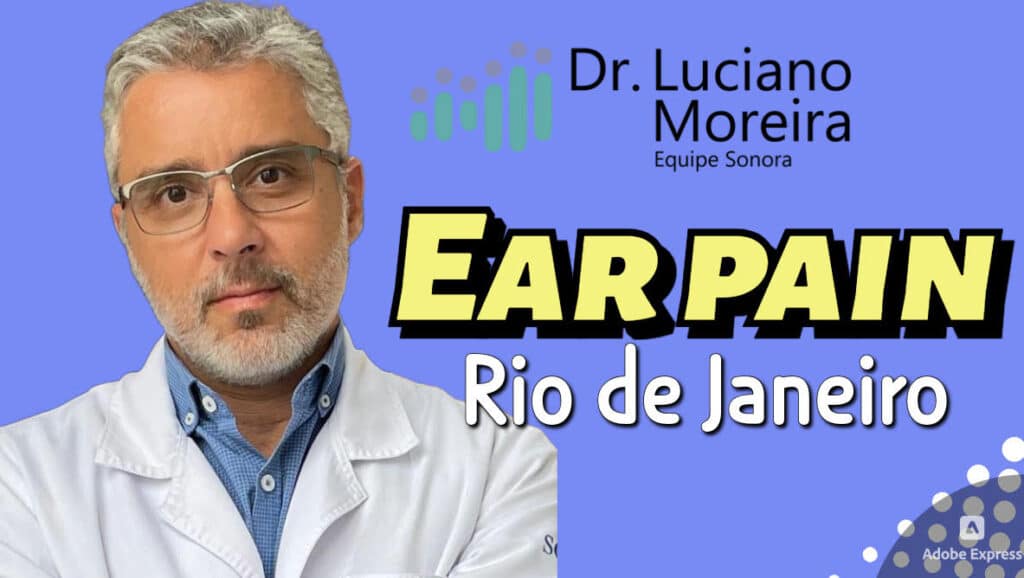Are you a tourist enjoying the vibrant city of Rio de Janeiro, but suddenly experiencing ear pain, an ear infection, or that uncomfortable feeling of a clogged ear? Don’t let these issues disrupt your travel plans. As a seasoned otologist with decades of experience, I’m here to provide expert care to ensure you get back to exploring the beaches, culture, and beauty of Rio without discomfort. At my clinic, conveniently located in the heart of Rio de Janeiro, I specialize in diagnosing and treating ear-related conditions, including ear pain, ear infections (otitis), and clogged ears. Let’s dive into understanding these conditions and how I can help you enjoy your trip to the fullest.
Understanding ear pain and ear infections
Ear pain and ear infections are common issues that can affect anyone, especially travelers exposed to new environments, climates, or activities like swimming in Rio’s iconic beaches. Medically known as otitis, ear infections can occur in the outer ear (otitis externa), middle ear (otitis media), or inner ear, each with distinct causes and symptoms. Ear pain, a frequent symptom, can range from mild discomfort to severe throbbing, often accompanied by symptoms like hearing loss, a sensation of fullness in the ear, or even discharge.
Tourists visiting Rio de Janeiro may encounter these issues due to factors such as:
-
Swimming in the ocean or pools: Prolonged exposure to water can lead to swimmer’s ear (otitis externa), a common outer ear infection caused by trapped moisture creating a breeding ground for bacteria.
-
Air travel: Changes in cabin pressure during flights can cause barotrauma, leading to a clogged ear or ear pain.
-
Climate changes: Rio’s humid and warm climate may contribute to ear infections or exacerbate existing conditions.
-
Allergies or colds: These can cause inflammation in the ear canal or Eustachian tube, leading to discomfort or infections.
If you’re experiencing ear pain, a clogged ear, or suspect an ear infection while in Rio, seeking prompt medical attention from an experienced otologist is crucial to prevent complications and ensure a speedy recovery.
Ear care in Rio de Janeiro: Dr. Luciano Moreira
With over 25 years of experience as an otologist, I have dedicated my career to helping patients overcome ear-related conditions with personalized, evidence-based care. My clinic in Rio de Janeiro is equipped with state-of-the-art diagnostic tools to accurately identify the cause of your ear pain or infection. Whether you’re a tourist visiting Copacabana, Ipanema, Leblon and other neighbourhoods in Rio, my team and I are here to provide world-class treatment to get you back to enjoying your vacation.
Our clinic provides:
-
Convenient location: our clinic is at Copacabana Medical Center, making it easy for tourists to access expert care without disrupting their travel itinerary.
-
Multilingual support: I understand the needs of international visitors and offer consultations in English, French, Spanish and Portuguese, ensuring clear communication and a comfortable experience.
-
Quick appointments: As a tourist, time is precious. My team prioritizes prompt appointments to address your ear pain or infection efficiently.
Common causes of ear pain and clogged ears
Ear pain and the sensation of a clogged ear can stem from various causes, and understanding them is the first step to effective treatment. Here are some common culprits:
-
Otitis externa (swimmer’s ear): Frequent swimming in Rio’s beaches or pools can lead to moisture buildup in the ear canal, causing bacterial or fungal infections. Symptoms include itching, redness, and pain that worsens when touching the ear.
-
Otitis media: This middle ear infection is often linked to colds, allergies, or respiratory infections, common among travelers adjusting to new environments. It can cause ear pain, fever, and a feeling of fullness.
-
Eustachian tube dysfunction: Changes in altitude during flights to or from Rio can block the Eustachian tube, leading to a clogged ear, muffled hearing, or discomfort.
-
Earwax buildup: Excessive earwax can cause a clogged sensation, hearing loss, or even pain. Professional ear cleaning by an otologist is the safest solution.
-
Foreign objects or trauma: Small debris or accidental injury to the ear canal while swimming or engaging in water sports can lead to pain or infections.
Ignoring these symptoms can lead to complications, such as hearing loss or chronic infections, so it’s essential to seek professional care promptly.
Tips for tourists to prevent ear pain and ear issues in Rio de Janeiro
Prevention is always better than cure, especially when you’re on vacation. Here are some practical tips to keep your ears healthy while exploring Rio:
-
Dry your ears after swimming: Use a clean towel to gently dry your ears after swimming in the ocean or pool to prevent swimmer’s ear.
-
Use earplugs: Consider wearing waterproof earplugs when swimming to reduce the risk of water entering the ear canal.
-
Equalize ear pressure: During flights, chew gum, yawn, or use the Valsalva maneuver (gently blowing your nose while pinching it) to relieve ear pressure.
-
Avoid inserting objects: Never use cotton swabs or other objects to clean your ears, as this can push wax deeper or damage the ear canal.
-
Stay hydrated and healthy: Drink plenty of water and manage allergies or colds promptly to reduce the risk of ear infections.
Ear Pain and Ear Infection: Expert Care with Dr. Luciano Moreira in Rio de Janeiro
Dr. Luciano Moreira, Otologist – Otolaryngologist is a leading specialist in ear health, ear surgery, hearing loss, otosclerosis, and cochlear implants in Brazil.

